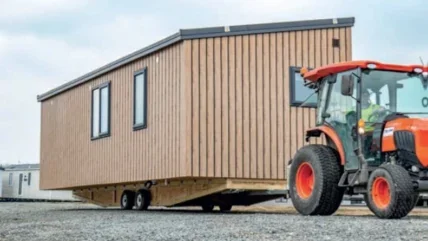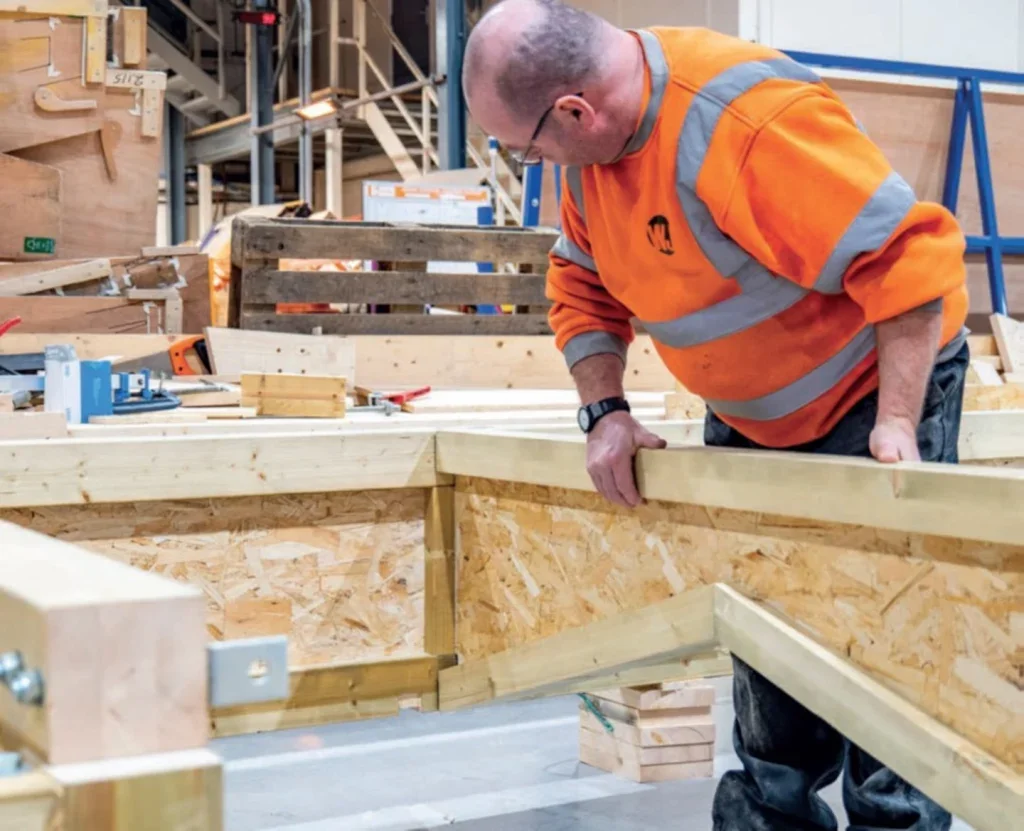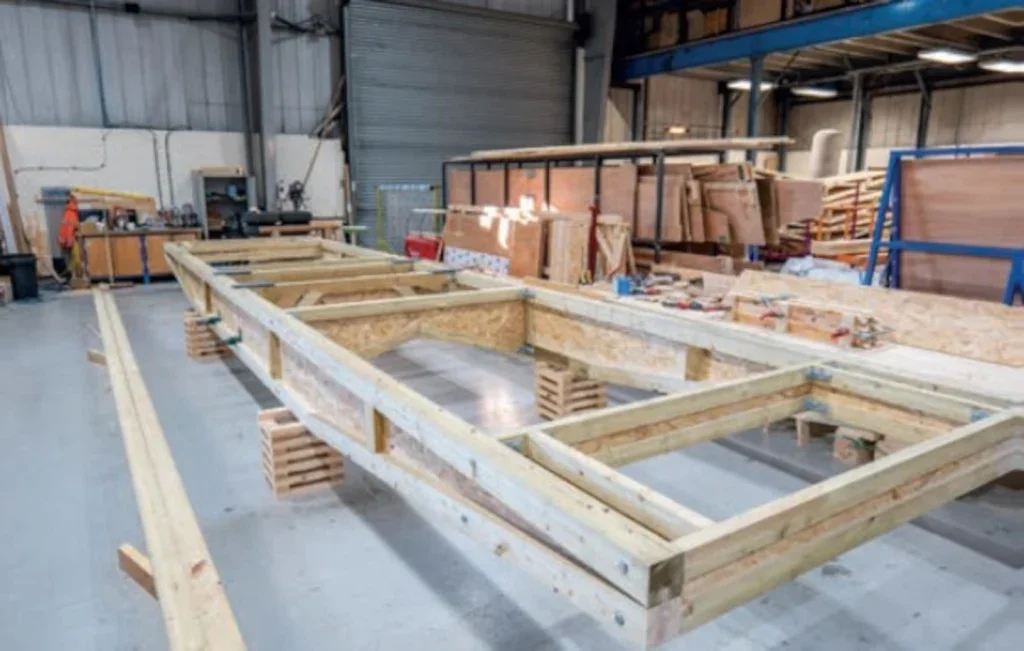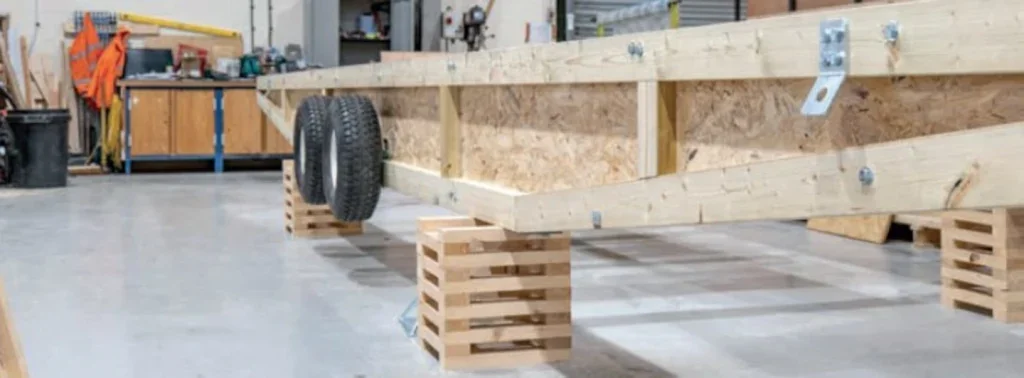
WJ Group has introduced an innovative timber chassis designed specifically for leisure homes, lodges, and smaller units. This cutting-edge product has officially launched into the market following the successful approval of two patents.
The timber chassis represents the culmination of more than three years of intensive research and development by WJ Components, the timber engineering division of WJ Group. Established in 2007, WJ Components has a long-standing reputation for delivering value-engineered timber solutions to the leisure industry, including roof trusses and I-beams. This timber frame chassis, winner of TTJ’s Timber Innovation Award 2024 [sponsored by ECC Timber Products], reflects the company’s ongoing commitment to advancing sustainable alternatives for traditional materials.
The primary objective behind the development of this timber chassis was to create a sustainable and environmentally friendly alternative to conventional steel or galvanized frames commonly used in holiday units. By utilising responsibly sourced materials, the timber chassis significantly reduces carbon emissions compared to its steel counterpart. A carbon analysis study conducted by Arete Zero Carbon highlighted the difference: a steel chassis produces 1,777.44kgCO2e during its production phases (A1–A3), while the WJ timber chassis generates only 465.92kgCO2e. When factoring in the carbon storage properties of timber, the chassis achieves a carbon-negative status of -42.3kgCO2e, making it a ground breaking solution for reducing the environmental footprint of holiday homes. This can support manufacturers in reducing upstream supply chain emissions, which are critical under Category 1 of the Greenhouse Gas Protocol.

This data underscores the chassis’ potential to revolutionise the market by addressing both sustainability and performance needs. Extensive testing and development processes have validated the timber chassis’ structural integrity and performance under a variety of conditions.
WJ Group collaborated with two of the UK’s leading holiday home manufacturers and an independent structural consultant to rigorously test the chassis. The testing process began with the creation of prototypes, followed by their integration into the manufacturing process for static caravans.
Structural deflection testing revealed that the timber chassis exhibited significantly less deflection compared to a steel chassis under similar conditions, ensuring better overall stability. This reduced deflection was especially beneficial during siting, where the timber chassis demonstrated superior retention of structural integrity, simplifying the installation process.
Ground transport trials evaluated the chassis’ performance over different types of terrain, while transportation testing simulated the loading and unloading of caravans from trailers. These trials confirmed that the timber chassis could withstand the stresses associated with movement and handling without compromising its durability.
Field testing on materials and weathering is ongoing, with one chassis currently sited on the East Yorkshire coast. This location, known for its exposure to salty air and harsh weather conditions, is providing valuable insights into the long-term impact of environmental factors on the timber. Additional development work is being conducted to compare the durability of marine plywood webs with existing weather-sealed OSB, further enhancing the chassis’ resilience.
The timber chassis has already gained traction among environmentally conscious manufacturers who value its sustainability benefits.

Drawing on WJ Components’ extensive experience in designing and manufacturing customised roof trusses for the leisure industry, the timber chassis benefits from the same level of precision engineering and attention to detail. Each chassis is tailored to meet the specific load and structural requirements of the unit it supports, ensuring optimal performance.
WJ’s technical team collaborates closely with manufacturers’ design and engineering teams to understand the unique parameters of each project, delivering solutions that align perfectly with their needs.

WJ Group continues to push the boundaries of timber engineering and sustainable design. With its patent approvals and demonstrated success in rigorous testing, the timber chassis represents a significant leap forward in eco-friendly solutions for the leisure market. It is not merely an alternative to steel but a bold statement of the industry’s potential to embrace sustainability without compromising on quality or performance.
As the demand for greener construction materials grows, WJ Group is poised to lead the way with innovative products that meet the needs of both manufacturers and environmentally conscious consumers. This timber chassis exemplifies the Group’s dedication to innovation, precision, and sustainability, offering a glimpse into the future of holiday home construction.





